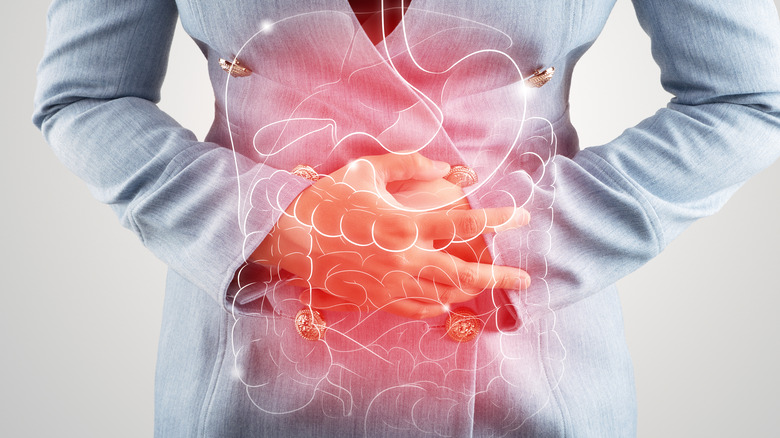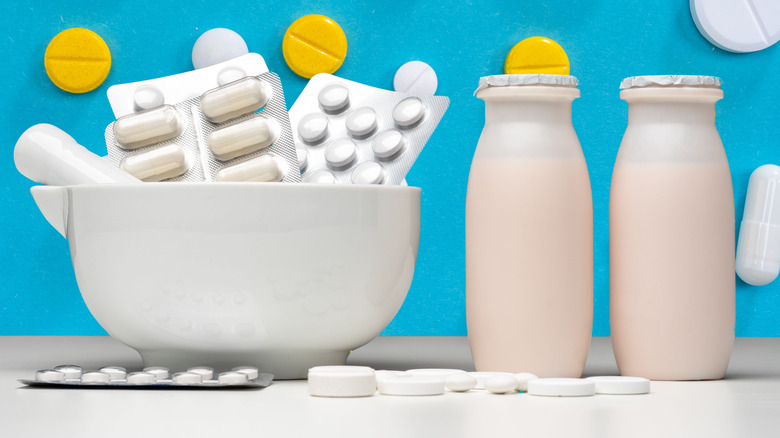Do Probiotics Help With IBS?
According to Healthline, as much as 21% of people around the world are affected by irritable bowel syndrome (IBS). The condition is categorized as a chronic disease and is marked by various gut-related symptoms.
Broken into 4 sub-types, diarrhea-predominant (IBS-D) and constipation-predominant (IBS-C) are 2 of the most common forms of IBS. Some people do experience both diarrhea and constipation (IBS-M) or unspecified characteristics (IBS-U).
In addition to diarrhea and constipation, abdominal pain, bloating, and gas are also indicators of IBS — specifically when the occurrence is weekly for at least 3 months and is coupled with pain during bowel movements and changes in stool frequency or appearance.
While the onset of IBS is unknown, stress along with some foods can activate the disease or even make it worse. Eliminating simple sugar like fruit, along with removing wheat, spelt, rye, barley, legumes, artificial or plant-based sweeteners, and even some vegetables can help reduce IBS symptoms. Some studies suggest that probiotics can also help.
Inactive probiotics may work best
Not to be confused with digestive enzymes, probiotics are good bacteria or yeasts that live in the body (per the Cleveland Clinic). A build-up of bad bacteria can lead to infections. When this happens, probiotics step in to help flush out the bad bacteria and return the body back to a healthy, balanced state.
Probiotics are part of a larger community of organisms called microbes, which contain a combination of bacteria, fungi, viruses, and protozoa. Microbes that don't naturally come from humans but have a proven benefit after safe consumption are called probiotics. Probiotics live in the skin, lungs, mouth, urinary tract, vagina, and stomach.
The 2 types of probiotics that can be bought at grocery stores are Lactobacillus and Bifidobacterium. The primary difference between the two, according to DifferenceBetween.com, is that Lactobacillus protects the body from being invaded by viruses. Bifidobacterium promotes immunity and good digestion. Bifidobacterium is also considered inactive, but that's not a bad thing.
The Harvard Medical School reports that this difference is why Bifidobacterium is a better solution for IBS. An 8-week clinical trial published in Lancet Gastroenterology Hepatology looked at whether Bifidobacterium bifidum could relieve IBS symptoms. Researchers found that 34% of participants who were given the probiotic felt at least somewhat relieved within 4 weeks and even more experienced adequate relief.
Alternatives to probiotics
If you experience negative side effects from taking probiotics, MedicalNewsToday recommends trading supplements for probiotic-rich foods like yogurt, kefir, or kombucha.
Yogurt is an easy substitution, as it can be found at virtually any grocery store. It's full of calcium, potassium, magnesium, riboflavin, vitamin B6, and vitamin B12. Even yogurt products like yogurt-covered raisins have a probiotic benefit. In fact, that's what you'll want to go for if you're leaning toward inactive bacteria.
Kefir is a beverage made of fermented milk and kefir grains. It comes from the Turkish word "keyif," which means "good feeling." While the milk ingredient in kefir is typically sourced from animals, plant-based options such as non-dairy milk, juice, and water provide the same benefit.
Kombucha is another probiotic beverage — it's a fermented tea that is similar to kefir. In addition to supporting gut health, kombucha can potentially reduce the risk of infections and heart disease, improve mental health, boost liver function, and help manage type 2 diabetes.



